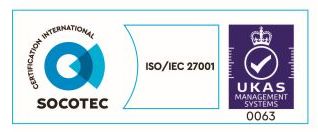We invited Phil Storey, the founder of Glow, to join us on episode 49 of The 20 Minute Marketing Podcast. The focus of this episode was on website maintenance and security which are two hugely important topics that often get overlooked by businesses and site owners.
Glow is an easy-to-use app which allows businesses, agencies and web developers to submit help requests, view a timeline of activity, and view improvement tips. They provide services to three user groups: end users, resellers, and web developers. Launching this year, Glow has seen a tremendous amount of growth and has received national and international press coverage from publishers including CNBC and TechRound.
During the episode, we covered website maintenance and security in detail. Phil began the episode by telling us some interesting statistics that prove how important it is to show some love to your website and ensure it is protected. Firstly, we found out that research suggests a website hack occurs approximately every 39% seconds online. Secondly. Phil told us that 45% of all website hacks take place on small business websites.
This was a surprising statistic because we assumed that hackers would typically aim to crack big websites and industry leaders. Clearly, we were wrong. Therefore, businesses of all sizes must pay attention to their site security and ensure that they provide regular maintenance. This responsibility is likely to fall under the collective scope of developers, marketers, and business owners. To help with this process, Phil shared numerous tips on how to keep sites securely functioning and ensure that they meet security requirements.
To listen to the full episode, check out the 20 Minute Marketing podcast on Apple Music, Spotify, Google Podcasts, and more. Here is a recap of our conversation in writing:

Let's start with a simple question, Phil. What is website maintenance, and how can businesses ensure that they are monitoring their site correctly?
Website maintenance is ultimately about making sure that your website is running smoothly. As you are now aware, we have three distinct user types. The act of website maintenance largely involves the same sort of tasks, however, the way it's perceived is different for each of those user types.

An end-user, like business owners, will have a website that needs maintaining. We try and get them to think of website maintenance with a real-world example. We get them to try and envisage website maintenance, a little bit like a car. So think of the last time you bought a car, over the years of having that car, you will do things such as put air in the tires, clean it, take it for a service. You do all those things with your car to make sure that it continues to work efficiently. What a mechanic would do to your car to fix it, we would do for your website.

Resellers, which are usually marketing agencies, often see site maintenance as a time consuming task that can sometimes cause disruption. For example, web developers at marketing agencies are often working on big projects for clients. All of a sudden, an email comes in from a client who says that they've just found out that a form is not working on their site. The developer then has to stop what they are doing and try to fix the issue before returning to the original task, which can impact focus and targets. Therefore, a service like Glow can help relieve the pressure.


When you say the words website maintenance, the business owners might assume that you're only talking about security and hack prevention, when actually there's more to it and other areas to consider, like broken link checking, for example.
Yes, exactly, but security is a big part of it. Our service helps to keep the wrong type of people out of your website. Research suggests that a hacker occurs on a website every 39 seconds, which is phenomenally regular. However, just because you might be a small or medium-sized business, this doesn't mean that you are exempt from these hack attempts. In fact, 45% of all hacks occur on small business websites.

Understandably, the vast majority of business owners are not aware that website maintenance exists as a service. They know what a website is, so they get one built, but then they do not know what is required to keep it running well and how to keep it maintained. Therefore, we have got a fair job to do to educate clients on the importance of maintenance and security.

I always try to use the kind of examples that I think clients will more easily understand. Think for a second that you own a shop and that you are closing up at the end of the day. You wouldn't leave the windows open, or the door locked, or the key in the door because that would not be safe or secure. So if you think about it, in a website sense, we do the sorts of things to stop people easily accessing your website just like you would a shop. There are lots of basic things that can be done that make it much harder for people to gain access to your website and that is a big part of what we do.


How frequently should we be monitoring our site for maintenance updates and security? It's a bit different to just locking up the office door at 5 pm and then driving away. So, should we be doing it daily, weekly, monthly?
It depends on the kind of task that we are referring to. WordPress is a global product which many businesses use. We would always advise that any updates available are performed as soon as possible, whether that's an update of WordPress itself as a system or any of the plugins that are installed on the WordPress site that require new versions. Hackers are constantly trying to gain access to WordPress websites and if updates are not performed, you are making it far easier for them to gain access. Hackers become well aware of the vulnerabilities in older versions of the software.

In terms of monitoring your site, you should be logging in every day to check for any updates or possible backup runs. Security backups fall under maintaining a website. Like everything in life, sometimes things can go wrong if a problem does occur you will be very glad to have your website backed up. We advise that you judge the regularity of backups based on the size of your website and how frequently you update it. If you are adding a lot of new content all the time, you probably want to backup daily. However, if you are not adding new content every day then we would recommend that you back your website up weekly.

There are lots of other tasks that fall under maintenance, whether it's checking for broken links or testing that the forms on the site are still working. We have seen lots of clients trip over on this before. This can be very damaging if it gets left for a while as forms can stop working. Your website should be the number one salesperson in your business, it's out there online in front of customers 24/7. If you have got your kind of branding and your message is clear, then it does pay off. One of your top priorities as a business should be to look after this very important asset in your business, particularly if you are spending money on marketing.


Is there anything else that we can do if something goes wrong? For example, if a site has been hacked, or if there's a site issue that needs fixing?
It helps to have your site backed up in more than one place. Always have something set up within WordPress, there are lots of plugins that you can add to your site that will automatically backup all of your files and folders in the database for websites. I think something else that could be done is to speak to the company that hosts your website directly (GoDaddy or 123 Register, for example). They will always keep a backup of your site. Then, of course, you can always speak to the person or company that originally built your website because they often should at least have kept a backup of the site too.


Do you have any real-life examples of a company that has got their site maintenance correct to prevent any issues?
There are loads of examples I could provide, there are examples of both good and bad. What I mean by the bad side is that several businesses have been caught out by not maintaining their site. One in particular, from earlier this year, this business's website was redirecting to dodgy content whenever anybody tried to access it. It was a very embarrassing situation for that company, as you can imagine, and not great for the reputation of the business. It didn't take us very long to figure out that it was happening entirely because they hadn't been performing security updates on WordPress. So, straight away we fixed the issue.


Hi, I'm Liam, Marketing Executive at Reach Interactive. I have a background in international marketing and love branding, social media and seeing how companies communicate with their customers.
TAKING CARE OF MILLIONS OF MESSAGES EVERY SINGLE DAY - TRY US FREE
Use our calculator to work out your price (£) per credit below:
(1 Credit = 1 × 160 character text message).

PARTNER : MIND




©2002-2026 All rights Reserved. Reach Interactive© is a registered trademark of Reach-Data Ltd is registered in the UK and Wales. Registration Number: 04602161. Privacy Policy Terms and Conditions